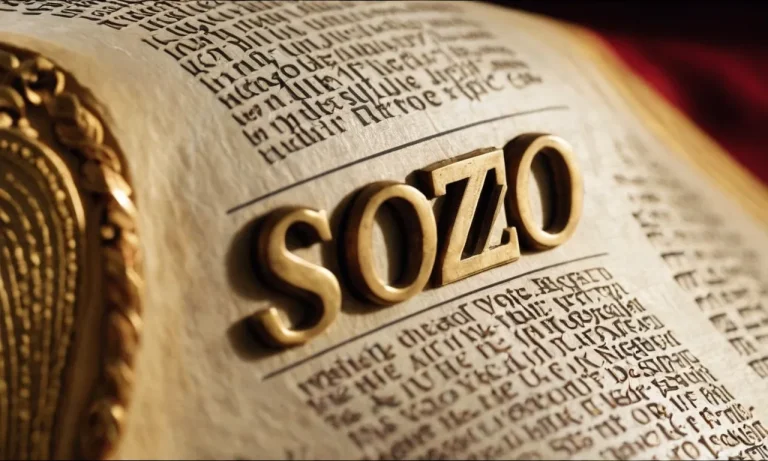What Does The Bible Say About The Book Of Enoch?
The Book of Enoch is an ancient Jewish religious work, ascribed to Enoch, the great-grandfather of Noah. It is not regarded as scripture by Jews or any Christian group, but is of great interest to some Christians due to references made to Enoch by the Apostle Jude in the New Testament.
If you’re looking for a quick answer, the Bible never quotes from the Book of Enoch, but does affirm Enoch’s righteousness and role as a prophet.
In this detailed article, we will examine what the Bible says about Enoch and any references made to his writings, the history and origins of the Book of Enoch, how early Christians viewed Enoch’s prophetic works, and an analysis of Jude’s references to Enoch’s prophecies regarding the coming of the Lord and the final judgement.
The Bible’s References to Enoch
Enoch in Genesis
The Old Testament refers to Enoch briefly in Genesis 5:18-24, in the genealogy from Adam to Noah. It states that Enoch “walked with God” and “God took him” at the age of 365. This implies Enoch had a close relationship with God and did not experience a normal death.
Significance of Enoch in Biblical Genealogies
As one of only two people described as “walking with God” in the biblical genealogies (along with Noah), Enoch holds special theological significance. His story shows it is possible to have an intimate fellowship with the Creator amidst a sinful world.
Though little detail is given, Enoch’s example has inspired much extrabiblical speculation and lore over the millennia. Multiple apocalyptic works have been attributed to him, reflecting the intrigue surrounding his unusual disappearance.
Prophecy of Enoch in Jude 1:14-15
The New Testament book of Jude contains a direct quote from the Book of Enoch referencing a prophecy by Enoch. Jude 1:14-15 states:
“Enoch, the seventh from Adam, prophesied about them: ‘See, the Lord is coming with thousands upon thousands of his holy ones to judge everyone, and to convict all of them of all the ungodly acts they have committed in their ungodliness, and of all the defiant words ungodly sinners have spoken against him.
‘”
This rare biblical reference to extrabiblical source material has sparked much interest. It lends validity to the Book of Enoch and suggests Jude considered it the authentic words of the biblical Enoch.
However, the rest of the Book of Enoch contains strange accounts of angels and giants that cause debate over the work’s reliability. Ultimately, the questions surrounding Enoch reflect broader discussions over canonicity and highlight tensions between biblical theology’s Jewish roots and later Christian developments.
The Origins and History of the Book of Enoch
Summary of the Contents
The Book of Enoch is an ancient Jewish religious work, estimated to have been written between 300 and 100 BC. It is traditionally ascribed to Enoch, the great-grandfather of Noah. The book includes visions, parables, and discourses related to the origins of evil and the eventual destruction of the wicked.
Some key topics covered include the fall of the “Watchers” (angels who fathered the Nephilim giants), Enoch’s travels to heavenly realms, the coming of the great flood, and the eventual defeat of the fallen angels.
The book provides important historical context for references made to Enoch and the Watchers in other ancient Jewish literature.
When and Where it Was Written
Most scholars believe the Book of Enoch was written in stages over a period of around three centuries, from 300 to 100 BC. The first part (chapters 1-36) is thought to have been composed in Judea, the second (chapters 37-71) in Galilee, and the third (chapters 91-108) in Judea again.
The book reflects Hellenistic Jewish culture, borrowing ideas from Hellenistic mythology as well as Jewish traditions. Themes and ideas in the text are typical of Jewish literature and culture in the 2nd and 1st centuries BC.
The use of the book by Jews in this era is confirmed by the discovery of copies among the Dead Sea Scrolls.
Preservation Among Early Christians
Although not considered canonical by Rabbinic Judaism, the Book of Enoch remained influential among Jewish mystics and early Christians. References to Enoch in the New Testament confirm early Christian knowledge of the book.
Passages from Enoch are also quoted directly in the New Testament book of Jude. Although the work was mostly unknown in Europe during the Middle Ages, it was well-known among early members of the Ethiopian church.
Today, the most complete surviving version of the Book of Enoch comes from Ethiopian manuscripts. The rediscovery of the book in modern times has provided an important window into Jewish theology between the Old and New Testaments.
Early Christian Views on the Book of Enoch
References in the Epistle of Barnabas
The early Christian writer Barnabas references the Book of Enoch in his Epistle of Barnabas, likely written in Alexandria, Egypt around the year 100 AD. Barnabas writes, “the final stumbling-block approaches… when some of the scripture of Enoch shall be written in honor of God.”
This shows that early Christians like Barnabas regarded Enoch as an inspired prophetic book. The Epistle of Barnabas affirms Enoch’s prophecy that sinners shall perish in the judgment, which Barnabas took as referring to the coming destruction of Jerusalem in 70 AD.
While the text of Enoch appeared to be widely known in the 1st and 2nd centuries, it would later fall out of favor with church authorities.
Tertullian Affirms the Book as Scripture
The influential early Christian author Tertullian, writing around 200 AD, unequivocally cites the Book of Enoch as Scripture. He writes in On the Apparel of Women that the fallen angels who married women “of course in the days of Enoch, when angels fell from heaven, took as their wives such women as single out men.”
This reference to the intriguing episode in Enoch of angels intermarrying with human women shows how Tertullian regarded events in the Book of Enoch as historical. In his Treatise on the Soul, Tertullian goes so far as to call Enoch “that apostle of God” and affirms his writings as divinely inspired.
However, Tertullian’s positive view of Enoch was rejected by later mainstream theologians.
Rejection by Later Church Fathers
While held in high regard by some early Christians, the Book of Enoch would come to be viewed skeptically and finally rejected outright by mainstream church authorities in later centuries. In the 4th century AD, the noted historian-bishop Eusebius of Caesarea suggested Enoch be classified as among “spurious” writings since it was not included in most church canons.
Augustine of Hippo also expressed doubts about Enoch. Later in the 5th century, the famous bishop Cyril of Alexandria completely rejected Enoch, especially due to its strange account of angels falling from heaven.
The reservations expressed by these eminent church fathers ensured the demise of the Book of Enoch from inclusion in Christian Bibles compiled in the medieval period.
Analysis of Jude’s References to Enoch’s Prophecy
Context of Jude’s Epistle
Jude, the brother of James and half-brother of Jesus, wrote his short epistle to address false teachers that had infiltrated the church (Jude 1:4). He aimed to encourage believers to contend for the faith delivered to them while exposing the ungodly lives of these imposters.
Jude references the Book of Enoch, an apocalyptic work named after Enoch, the great-grandfather of Noah (Genesis 5:21-24).
Linking the Coming of the Lord to Enoch
In verse 14-15, Jude quotes a prophecy from 1 Enoch 1:9, which foretells the coming of the Lord for judgment. By citing Enoch’s prophecy, Jude connects it to the eventual return of Christ to judge the ungodly.
Enoch stands out as one who walked with God by faith (Genesis 5:22-24), giving weight to his prophecy. The ungodly scoffed at the promise of Christ’s return (2 Peter 3:3-4), so Jude aimed to reassure believers that just judgement awaited.
Rebuking False Teachers
Jude exposed the ungodly behavior of the false teachers by citing three historic examples of those under God’s judgment – unbelieving Israelites (v5), angels who fell (v6), and the cities of Sodom and Gomorrah (v7).
Likewise, Enoch’s prophecy assured coming judgement on the imposters’ licentiousness and rejection of authority (v8). Jude sought to motivate his readers to save the false teachers through compassion while hating the garments stained by their sinful flesh (v23).
Conclusion
In summary, while the Bible does not directly quote from the Book of Enoch, it confirms Enoch’s righteousness, his role as a prophet who prophesied the Lord’s coming in judgement, and the legitimacy of his vision recorded in the ancient extra-biblical work.
The Book of Enoch provides valuable historical insights into Jewish apocalypticism and messianic expectations before the time of Christ, even if its origins and teachings are disputed. Ultimately, Jude affirms the truth of Enoch’s prophecy while stopping short of elevating the Book of Enoch to the level of inspired Scripture.







